

Most ebook files are in PDF format, so you can easily read them using various software such as Foxit Reader or directly on the Google Chrome browser.
Some ebook files are released by publishers in other formats such as .awz, .mobi, .epub, .fb2, etc. You may need to install specific software to read these formats on mobile/PC, such as Calibre.
Please read the tutorial at this link: https://ebookbell.com/faq
We offer FREE conversion to the popular formats you request; however, this may take some time. Therefore, right after payment, please email us, and we will try to provide the service as quickly as possible.
For some exceptional file formats or broken links (if any), please refrain from opening any disputes. Instead, email us first, and we will try to assist within a maximum of 6 hours.
EbookBell Team

0.0
0 reviewsThe Internet and "social media" may initially have been understood as just one more instrument politicians could employ to manage without political parties. However, these media cannot be reduced to being a tool available solely to politicians. The electronic media make reinforcement of the "glocalization" of the public and political sphere, a process already set in motion with the advent of television, and they can develop the trend even further.
Political parties are therefore once again becoming indispensable; they are in an unparalleled position to recreate social and political bonds, for only they stand both at the center and on the periphery of the new sphere encompassing public and political life.
TABLE OF CONTENTS
New Technologies: Helping Political Parties and the Democratic Processes or Threatening Them? (Guy Lachapelle and Philippe J. Maarek)
Part I: The Integration of Technological Innovations in the Practices of Parties and Citizens
Innovations in Information Technology in American Party Politics Since 1960 (Kenneth Janda)
Internet, Social Media Use and Political Participation in the 2013 Parliamentary Election in Germany (Reimar Zeh and Christina Holtz-Bacha)
Part II: The Consequences of New Technologies on Activism
The Decline of Activism in Political Parties: Adaptation Strategies and
New Technologies (Eric Montigny)
Party Activists and Partisan Communication in Quebec (Isabelle Gusse)
Part III: The New Role Played by Social Networks
Changing Communications? Political Parties and Web 2.0 in the 2011 New Zealand General Election (Ashley Murchison)
Social Media and American Presidential Campaigns: The Dark Side of the
Electoral Process (Karine Premont and Charles-Antoine Millette)
Part IV: The Resilience of the Printed Press in the United Kingdom
The United Kingdom Independence Party (UKIP) and the British Press:
Integration, Immigration and Integrity (David Deacon and Dominic Wring)
Part V: New Technologies and Leadership Evolution
Political parties and the Internet: changes in society, changing politics –
the case of the Parti Quebecois (Guy Lachapelle)
Political communication, electronic media and social networks in France (Philippe J. Maarek)
Index of Proper Nouns